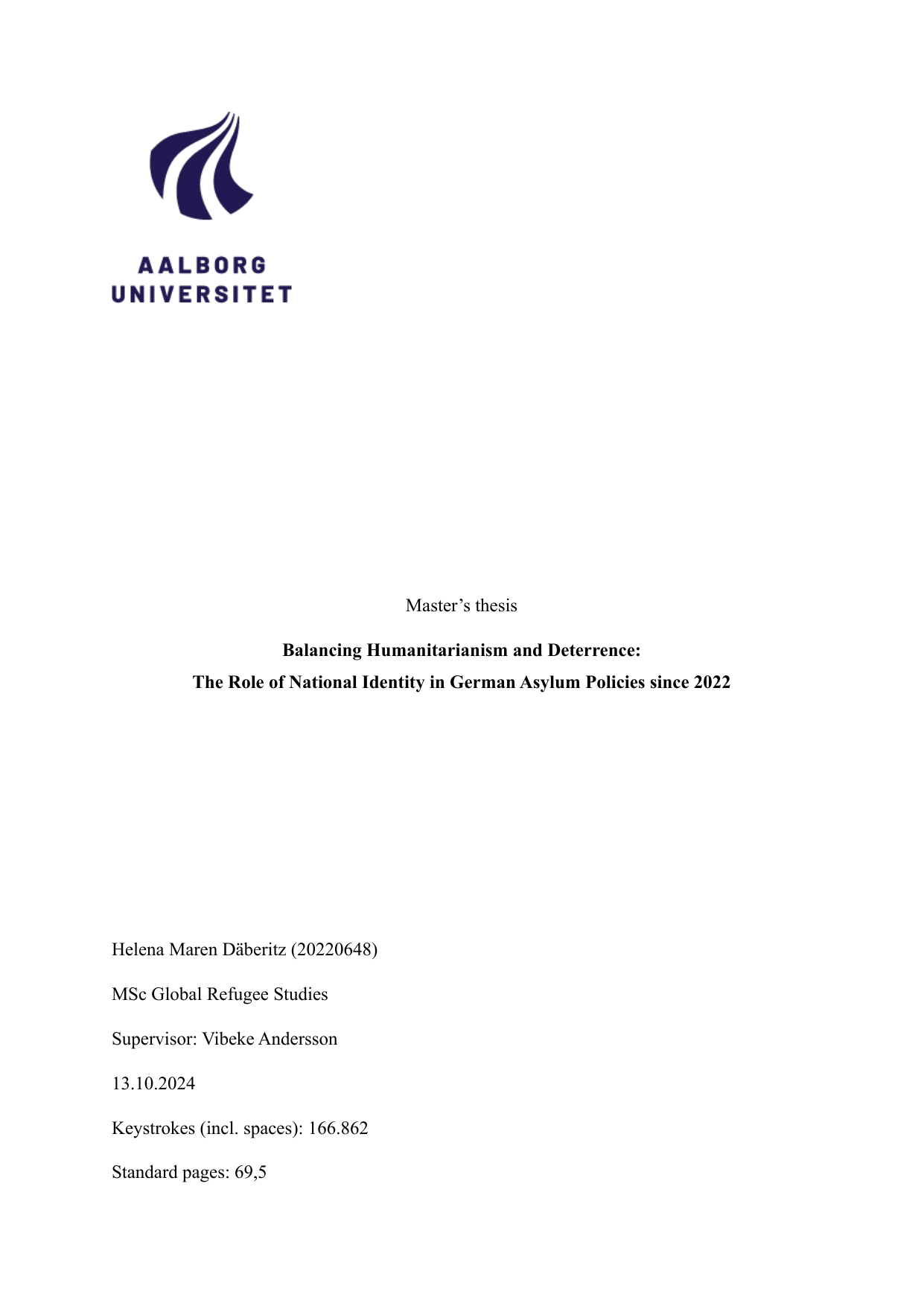
Balancing Humanitarianism and Deterrence: The Role of National Identity in German Asylum Policies since 2022
Author
Term
4. semester
Education
Publication year
2024
Submitted on
2024-10-13
Pages
69
Abstract
In 2015, former chancellor Angela Merkel’s now infamous quote, “We can do this”, marked the beginning of Germany’s welcome politics. The policy was characterized by liberal asylum measures going beyond the protection standards set by the European Union. It has been argued that this was partly the result of Germany’s identity. With no history on which to base an identity in the aftermath of the Third Reich, Germany instead built on the newly established European Union. Thus, the two share the underpinning values of human rights, democracy, and the rule of law, which create the foundation for their shared humanitarian and civilian identity. However, a growing anti-immigration stance in the public, institutionalized in the form of the right-wing Alternative für Deutschland party, has been argued to skew the country’s asylum politics towards the right. The new government inaugurated in 2022, which replaced the Christian Democratic Party as the strongest party and Merkel as chancellor after 16 years, announced its plans to change the direction of asylum politics in line with its motto ‘a new start for German migration politics’. Under this motto, the new government introduced policies that civil society organizations have criticized as deterrence-based measures restricting the rights of aslyum seekers. Among these were card-based and reduced welfare benefits as well as increased deportations. This research seeks to identify the strategy behind these policies and examine the role Germany’s identity plays in it. Thus, it utilizes Bacchi’s (2009) What’s the problem represented to be method of policy analysis, constructivist theory and Gammeltoft-Hansen’s (2017) negative nation branding concept to answer the two research questions: “Which strategy can be identified behind the asylum politics of the new German government?” and “What role does Germany’s identity play in its asylum politics strategy?”. The What’s the problem represented to be method is used to analyze three of the asylum policies introduced since 2022: the Act on the Acceleration of Asylum Court Proceedings and Asylum Procedures, the Act to Improve Repatriation, and the Bezahlkarte. Based on these bills, this thesis identified a strategy in which Germany seeks to uphold its humanitarian responsibility towards asylum seekers while simultaneously pursuing the goal of decreasing the number of asylum seekers in the country. This tension between humanitarianism and deterrence plays out through a ‘good’ vs. ‘bad’ asylum seeker binary, in which the category of the ‘bad’ asylum seeker is continually expanded while the ‘good’ category is used as a theoretical. It is further complicated by the introduction of liberal measures for ‘productive’ asylum seekers challenging the deterrence-based strategy. Due to these tensions, Germany is unable to communicate the ‘hard-line’ anti-immigration branding needed in order to efficiently fulfill its goal of reducing the number of asylum seekers, as argued by the negative national branding concept. Clashing strategy goals, legal geographical limitations and coalition-internal tensions produce contradictory policy outcomes, which affect the overall strategy's coherence, making consistent branding impossible. However, the new policies provide the political foundation for such a branding. Thus, this research concludes that Germany’s humanitarian identity hinders the country from successfully pursuing part of its strategy goals. However, right-wing political shifts are pushing for a reconstruction of the German identity and thus altering the country’s receptiveness to international human rights norms. While this thesis conluded that it is unlikely that this will result in an identity shift during the current legislative period, the policies provide the foundation for it in the future. An identity shift away from humanitarian norms could not only impact Germany’s asylum policies but also affect other policy fields, as well as potentially contribute to or mirror a broader change in the European Union’s identity.
Keywords
Documents
